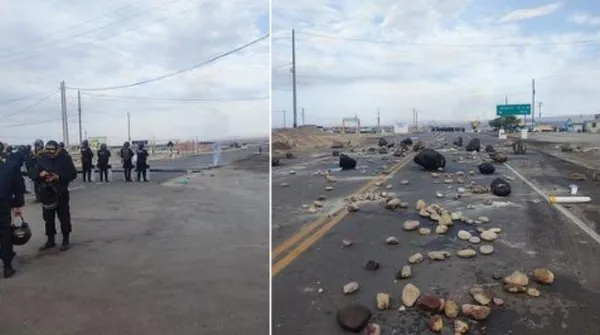Peru's agriculture sector is losing an estimated $100 million a day due to the riots, says the country's Luis Fernando Helguero, Minister of Foreign Trade and Tourism. Amidst a national state of emergency in Peru lasting for 30 days that extends over the Christmas period, the country's multibillion-dollar table grape and blueberry industries, amongst others, have been severely impacted. Producers say they are unable to reach key production areas, partly due to roadblocks amidst a heavy army and police presence to restore order. Exports to the country's ports are also hindered.

"The damage is great, and it is estimated around $100 million for the agribusiness for the days that we are inactive. We are in the harvest period, culminating with the blueberries and the grapes are in full swing because when the grapes are ripe, they have to be harvested. They cannot wait, and that has to come out with containers that go to the international market," stated Minister Fernando Helguero. He fears that Peru will lose out market share when buyers from markets will switch to orders from Chile and other Southern Hemisphere competitors to secure supply.
Representatives of the Peruvian table grape association, Provid, as well as the blueberry industry body ProArándanos said they are assessing the impact and potential damages and waiting on the state of emergency to calm things down in the country before issuing statements about what to expect from their respective industry's going forward. "Unfortunately, the situation in the country continues to be critical, so the Board of Directors has decided to wait for things to calm down a bit before being able to pronounce on the table grape campaign in Peru. We trust that the prospects and current conditions will improve in the coming days. On the other hand, given the recent declaration of a State of Emergency at the national level, we hope that this will allow the re-establishment of regular harvesting, and the opening of roads and shipments, during the next few days. We will be announcing a second projection for the table grape export campaign during the next week, trusting that the prospects and current conditions improve in the coming days," stated Alejandro Cabrera Cigarán from Provid.
Luis Miguel Vegas, manager of the Association of Blueberries Producers of Peru (ProArándanos) said: "I am in the process of quantifying damages and losses so that we have a clearer picture."
A table grape produce and exporter who did not want to be named explained the situation on the ground across different areas in Peru where they have farms. They also share feedback from other table grape producers: "In the North, to be more specific, in Trujillo, the area is completely closed. They have blocked the roads this has not allowed us to reach our offices nor our clients. In the South zone in the Arequipa area, there is a lot of violence, with even one person dead. They have burned large companies like Danper and Gloria. These are two agro-industrial companies. The truth is that this is a huge shame because they are great businessmen who give work to thousands of families. In Arequipa, the army is taking control of the city, trying to restore order. Finally, at our Ica headquarters, they have blocked the roads, set fire to tolls, etc. This will affect the grape harvests that were being carried out in these weeks. Ica and Arequipa have been declared in a state of emergency, which is why the armed forces are being deployed to restore order to the interior of the country."
"On the other hand, talking with my colleagues about how these violent protests affect grape producers, we have reached the following conclusions: First, that it affects the loss of fruit quality since we are in full grape harvest in our region, and this product is highly perishable and must be harvested in the right time because from there its quality decreases. Because of that, prices fall, and we are losing opportunity and market positioning. Secondly, the cost of production due to this chaos in the city. The agricultural sector is dealing with the rise of labor, the delay in harvesting and logistics, and the increase in fertilizer shortages. All this increases the cost of exponential bread production. Thirdly, competition, as an exporting country, we have strong competition, such as Chile and South Africa, that can displace us because this situation of chaos benefits them since Peru will not be able to provide timely attention with its commitments to deliver to the market. It is a shame to tell you sad news from my country. It is expected that President Dina Boluarte will give a more conciliatory message and seek a solution to avoid seeing more Peruvians continue to die and destroy what has cost us so much," concluded the feedback from the Peruvian table grape producer and exporter.
For more information:
PROVID
Email: [email protected]
www.provid.org.pe
ProArándanos
Tel: +51 980 503 363
Email: [email protected]
www.proarandanos.org
